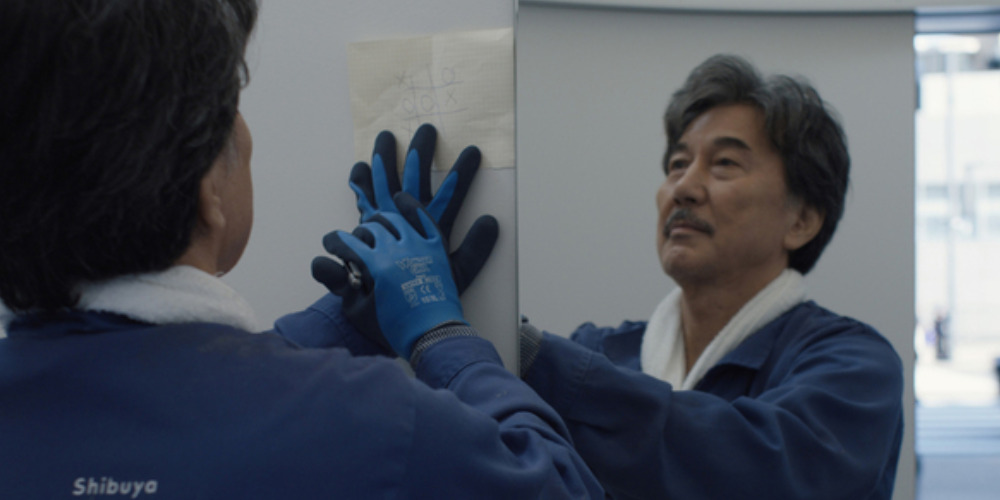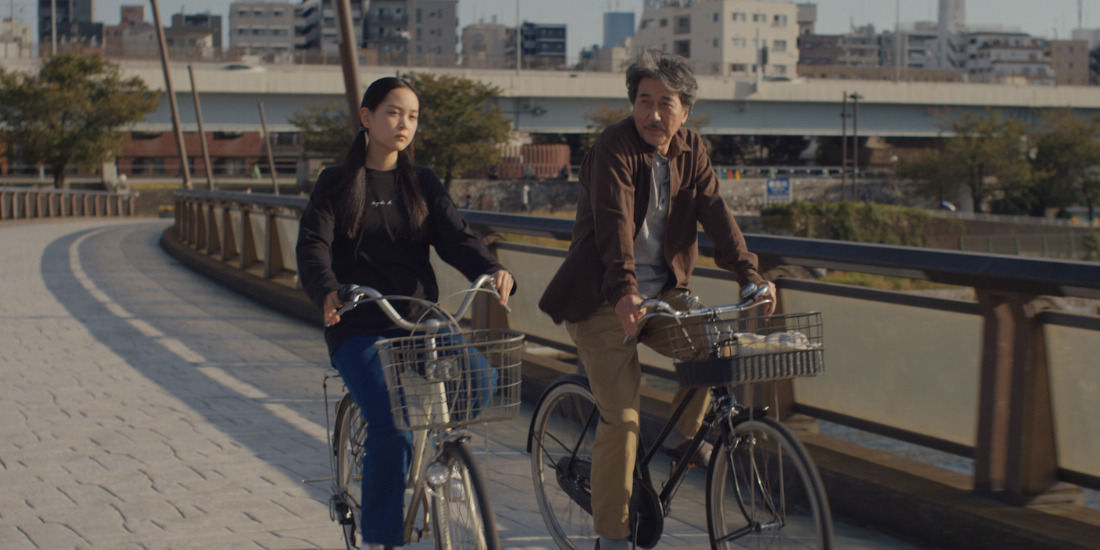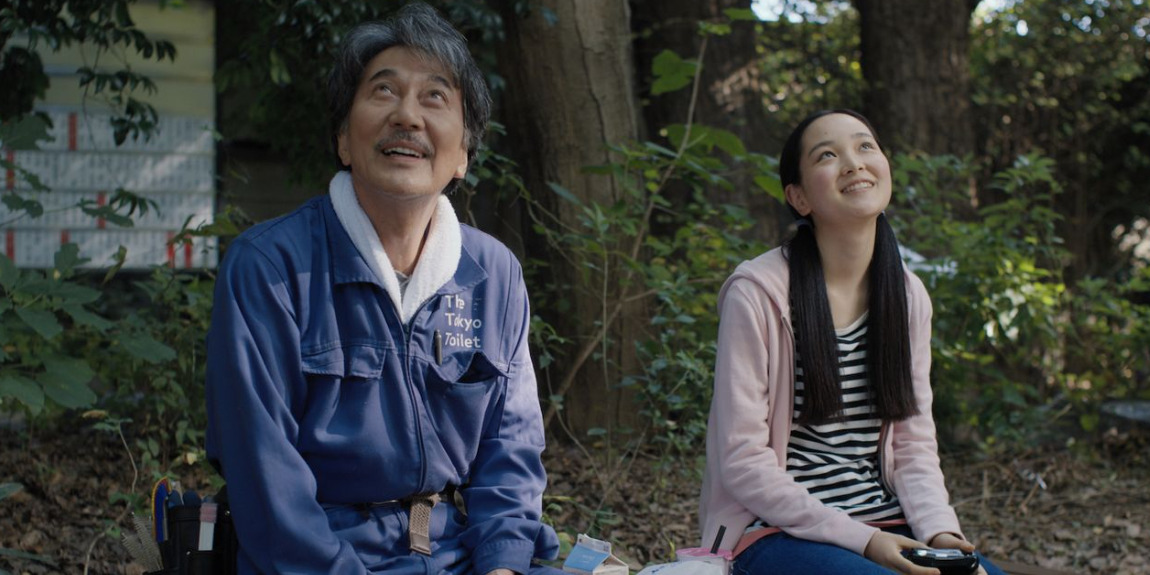The Japanese film, ‘Perfect Days,’ directed by German filmmaker Wim Wenders, charts a moving story about a man’s ordinary life and its extraordinary quiet revelations. Following Hirayama, a janitor who cleans public restrooms, the narrative revolves around the man’s routine life, with each day unfolding in similar patterns. Yet, as the man moves through one public park to another, the days— peaceful in their monotony— also bring something distinct into Hirayama’s life. As a few changes come his way, most significantly in the form of his runaway niece, Niko’s arrival— some of his past comes out in the open, informing his future to come.
Hirayama’s story maintains a picturesque, free-flowing pace as the man goes through the motions of his everyday structured life. Consequently, tension builds gradually and more subtly, allowing viewers a more authentic peek into life’s fluctuations. Therefore, as his story comes to an end, viewers might hold onto some questions about the quality of Hirayama’s life and what it says about the man. SPOILERS AHEAD!
Perfect Days Plot Synopsis
Each morning, Hirayama wakes with the dawn to the sound of a woman sweeping the road outside his small apartment. His morning rituals include making his bed, caring for his small army of potted plants, and buying a coffee from the vending machine outside before loading on in his van to attend to his janitorial duties. Like clockwork, he makes his rounds at different Tokyo Toilet Project’s public restrooms situated around different parks. Eventually, he’s joined by his junior, Takashi, who is much more interested in impressing Aya than his work.

Although Hirayama performs a vital task by ensuring such public essentials remain in pristine conditions, it remains a thankless job. Nevertheless, he isn’t bothered by the same, pleased to work around the morning sun, enjoying his lunch under the shade of a park tree. During the same time, the older man also captures old-school film photographs of Komorebi— the sun rays that filter down through tree leaves. After work finishes in the early afternoon, the man visits a bathhouse, where he may indulge in some sumo match viewings.
Likewise, Hirayama also watches some baseball when he goes out to eat at a local diner. However, apart from the same, the man remains detached from modern technology, satisfied with his analog lifestyle. Before bedtime, he reads a book under his bedside lamp until night sweeps him away into dreams of mazed black-and-white memories.
The only time Hirayama’s days depart from their set routine is on the weekend when, in lieu of his regular job, the man does his housework, peruses the local bookstore looking for his next read, and visits a hole-in-the-wall bar. Furthermore, he gets his photos developed and sorts the Komorebi shots into tin boxes, having collected almost a closet full of memories.
Even so, Hirayama isn’t opposed to the occasional change that comes his way, such as Takashi’s dead-end love life or a tic-tac-toe game a faceless stranger plays with him over the course of a few days. Yet, his niece, Niko’s sudden arrival at his house, remains the biggest change in his life. Niko surprisingly fits into his life, accompanying him to his job and showcasing a similar interest in nature photography. However, her presence also brings questions about Hirayama’s departure from his past family and lifestyle in favor of pursuing a career as a janitor with an unadventurous life.
Perfect Days Ending: Hirayama and The Barkeeper’s Ex-Husband
As it would turn out, Niko only remains a temporary fixture in Hirayama’s life. The young girl ran away from her home to visit her uncle, who had cut off all contact with his family. For the same reason, she wanted to seek out answers about him and his complications with her mother and the rest of the family. Yet, Hirayama can’t provide any such answers to her. Instead, he can only showcase how satisfied he feels in the new life he has built for himself.

Hirayama’s house isn’t big enough to provide comfortable space for two people— causing the man to set up his bed inside a closet. His work, cleaning toilets, earns him no appreciation from the public, who benefits from his services. And lastly, his life remains cyclic, filled with the same morning drives with rock music cassettes, lunch breaks, and midnight reads. Still, Hirayama has found happiness within this cycle.
After Niko’s mother and Hirayama’s sister arrive at his door to take her daughter back, the woman realizes the same, much to her astonishment. The siblings’ brief reunion remains civil, with his sister’s recollection of his favorite chocolates suggesting she never forgot about him. Nonetheless, Hirayama turns down her invitation to visit their father as he lies on his deathbed, suggesting a taut history behind the same.
Likewise, the following sequence, wherein Hirayama runs into the local barkeeper’s ex-husband, hints subtly at a similar horror from Hirayama’s past. The weekend after Niko’s return, after a tough few days at work, Hirayama pays the local bar a visit for some comfort. However, during the same, he accidentally witnesses a tender moment between the barkeeper and a man, who hug each other in earnest.
Afterward, the man seeks Hirayama out once the latter arrives at the river bank in the evening to drink a few beer cans in solitude. During their unexpected meeting, the stranger reveals he’s the barkeeper’s ex-husband. Although the two had an amicable divorce, with the man having remarried already, he still wanted to visit her after learning about his cancer diagnosis.
As the stranger stares into the face of inevitable death with no choice but to resort to his fate, Hirayama is able to provide a few moments of whimsy to the man by encouraging him to engage in a game of shadow tag with him. The moment showcases a startling sense of honesty within Hirayama’s character. Despite the horrors that life has thrown at the other man, Hirayama finds a way to present a moment of respite for him.
As such, one can’t help but wonder if Hirayama learned this lesson— of finding happiness when faced with a hopeless dead-end— from a personal experience. Due to Niko’s visit, we know that Hirayama’s family is financially well-off. For the same reason, the question arises as to why exactly Hirayama lives a life of solitude as a janitor, keeping track of coins in dishes.
Still, Hirayama’s satisfaction with his current life remains blatantly evident. He may be saddened to see his sister leave again, with Niko in tow, but he’s happy to spend his days as a janitor, free to live in life’s bylines and soak in existence’s quiet beauty. Even though we don’t know what compelled him to trade an SUV for a custodian’s van— be it a disease, familial complications, or something darker— the fact remains that he overcame his past and lives a content life now. Thus, once confronted with a man living on borrowed time, Hirayama knows how to instill a moment of hope within him— through shadows on a riverside pavement that remains reminiscent of Komorebi on a park floor.
Is Hirayama Happy? Why Did He Laugh and Cry In The End?
Putting Hirayama’s interaction with his family and the cancer-diagnosed stranger into perspective shines a different light upon the man’s life. He may live a life of tedium, but his elusive past suggests tumultuous and possibly traumatic experiences that came before this quiet life for Hirayama. As such, everything— from his photography hobby to his extensive rock music collection— holds a piece of his past life.

Therefore, as the film comes to an end, with the narrative choosing to stop documenting Hirayama’s life on his drive to work, it showcases how his days have evolved. Whatever his past may have held, he’s living a happier life, free to indulge in monotony— or stability, in other words. Yet, he hasn’t erased his past. The experiences he underwent before choosing a better life for himself still cling to him. Thus, he has created a bittersweet reality for himself.
Ultimately, the ending scene is open to the viewers’ interpretation, allowing others to project their experiences on Hirayama’s story. Still, the underlying message of life’s juxtaposing nuance remains. Perhaps actor Koji Yakusho, who portrays Hirayama’s central character, explained it best in an interview with Movie Web.
“[But] One thing I can say for sure is that humans don’t laugh or cry just when they’re feeling happy or when they’re feeling sad,” said Yakusho. “It can be the other way around. In that moment, he might have been laughing because he didn’t know why he was crying. But in another way, I think he was going to have a very happy future. A happy life. And for me, it was a very hopeful moment.”
Read More: Is Perfect Days Based on a True Story?


You must be logged in to post a comment.